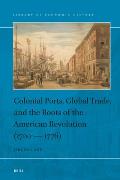Land is currently Postdoktor in the Department of Economy and Society at the University of Gothenburg and a visiting scholar at the University of Helsinki. He received Ph.D. at Georgia State University in 2019.
Carp summarizes Land’s argument this way:
First, he argues that scholars should understand Boston, New York City, and Philadelphia, as well as the smaller towns in their orbit, as a complex, integrated “port complex” or “port system” rather than fetishizing them as entrepôts for distinct regions (15). . . . Together they formed a “nodal center” that was independent of the British metropole (3).(That’s “Illicit Affairs: Philadelphia’s Trade with Lisbon before Independence, 1700-1775,” published in Ler Historia in 2019 and available here.)
Second, with that in mind Land argues that these cities’ mercantile interests developed and deployed their own resources, rather than acting as handmaidens to British sources of capital. Indeed, he argues, the metropole often stumbled as an inadequate manager of colonial economic interests. By contrast, since American merchants owned a third of the empire’s merchant marine tonnage, “colonial investment was quite capable of sustaining itself without being dependent on British capital” (51). . . .
Third, the British didn’t actively opt for a policy of “salutary neglect” toward the colonies (151). Imperial officials went through earnest phases of trying to enforce mercantilism, particularly after incurring debts during the Seven Years’ War, but these officials also went through phases of accommodating local merchants or leaving them alone. Ultimately, a lack of imperial capacity to enforce customs laws or provide sufficient specie forced the American cities to go outside the British Empire for circulating currency, specie, and trade routes.
Trade with the Caribbean and outside the empire was on the whole more important to American merchants than was trade with Great Britain. By referring to “trans-imperial trade networks,” Land avoids any romantic, Han Solo-esque associations we might have with smuggling and takes a clearer look at American trading networks outside the British Empire (2). While illegal trade can be difficult to document, Land finds plenty of suggestive evidence. As perhaps the best example, he draws from an earlier co-authored article to demonstrate that Lisbon records show 73% more trade with Philadelphia than the Philadelphia customs house records (Land and Dominguez, 2019, 148–49).
By trading outside the empire, northern merchants had mounted a “resistance” to British mercantile policy long before the 1760s, and the customs service was essentially powerless to enforce its Navigation Acts (2). Although the British Empire ramped up its enforcement efforts after 1763, these efforts backfired. American merchants decided that “membership in the British Empire … was not worth the effort” (3).At the end of the Revolutionary War, however, many American merchants were shocked to discover that they could no longer trade with those British Caribbean islands, or with the metropole (i.e., London and other British ports). There followed a painful adjustment as the nation tried the China trade, feelers into other empires, and finally a trade pact with Great Britain. Membership in the British Empire may not have been worth it, but independence wasn’t easy either.

No comments:
Post a Comment